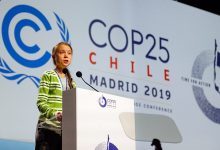Swedish climate activist Greta Thunberg has used an address to the UN climate talks in Madrid to hit out at countries, such as Australia, who are seeking to establish loopholes in their Paris climate targets rather than committing to take meaningful action to address the climate crisis.
Thunberg, who was named on Wednesday by Time Magazine as the “person of the year”, addressed climate negotiators and government leaders in Madrid, calling on them to focus on ways to listen to the science and increase their ambition to reduce global greenhouse gas emissions and to limit global warming.
“Finding holistic solutions is what the COP (conference of the parties) should be all about, but instead it seems to have turned into some kind of opportunity for countries to negotiate loopholes and to avoid raising their ambition,” Thunberg said.
“Countries are finding clever ways around having to take real action, like double counting their emissions reduction and moving their emissions overseas and walking back from their promises to increase ambition.”
“This has to stop. What we need is real, drastic, emissions cuts at the source. But of course, just reducing emissions is not enough, our greenhouse gas emissions have to stop,” Thunberg added.
“I still believe that the biggest danger is not inaction, the biggest danger is when politicians and CEOs are making it look like real action is happening, when in fact almost nothing is being done apart from clever accounting and creative PR.”
Several countries, including Australia, along with Brazil, Russia and the Ukraine, have sought to establish loopholes within the rules of the Paris Agreement, that comes into force in 2020, to ensure they can use excess emissions permits from the previous Kyoto Protocol to meet future targets.
This proposal has been widely criticised as a way for countries to shortcut their emissions reduction pledges rather than working to reduce their national emissions and is seen to be in contradiction with the ‘spirit’ of the Paris Agreement.
Fiji’s prime minister Frank Bainimarama singled out Australia and its attempts to use Kyoto credits – surplus from its deal that allowed it to increase emissions rather than cut them – to meet almost the entirety of its Paris commentment.
“As I like to say, we’re all in the same canoe. But currently, that canoe is taking on water … and there are too few of us trying to patch them. As a retired seaman myself, I can tell you this: You can’t fix a leaky boat with Kyoto credits!” Bainimarama said.
According to Richie Merzian, a former Australian climate negotiator who is attending the talks on behalf of The Australia Institute, minister Angus Taylor arrived at the talks to face opposition to Australia’s proposed use of the Kyoto credits.
“Australia has always demanded an easy ride at international climate talks. Back at Kyoto in 1997 Australia demanded what became known as ‘the Australia clause’ which redefined land clearing in a way that made Australia’s emissions targets very easy to meet. And then of course back in Kyoto when other countries were committing to reduce emissions we set our target as an increase in emissions of 8 per cent. But our latest demands are our most outrageous,” Mezian said.
After addressing the COP25 talks on Tuesday, Federal minister for energy and emissions reduction Angus Taylor has since left Madrid, following his own address to the talks on Tuesday, leaving diplomats to negotiate a solution to the carryover impasse.
The Australia Institute has released a report saying there is no legal or moral basis for Australia to claim the credits.
On Wednesday, Time Magazine announced that Thunberg was its ‘Person of the Year’ for 2019, seeing Thunberg become the youngest ever person to receive the honour and just one of the handful of women.
Thunberg expressed her frustration at the lack of meaningful action on climate change, and the focus on the emotive parts of her speeches, rather than the message that young people are longing for action from governments.
“We are desperate for any sign of hope. I’ve given many speeches and learned that when you talk in public you should start with something personal or emotional to get everyone’s attention,” Thunberg added.
“You need to say things like ‘our house is on fire,’ ‘I want you to panic,’ and ‘how dare you.’ But today I will not do that, because then those phrases are all that people focus on. They don’t remember the facts, the very reason why I say those things in the first place,” Thunberg added.










